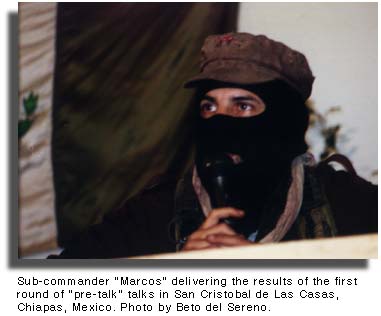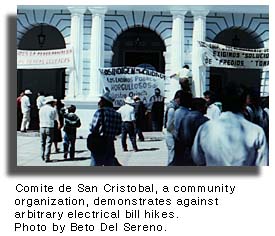|
"Never Again A Mexico Without Us"
Report on an interview with EZLN Sub-Commander "Marcos" On the Importance of the Permanent National Indigenous Congress by Beto Del Sereno San Cristobal de Las Casas, Chiapas, Mexico
Extremely important in terms of strategy is Marcos's statement that he hopes certain sectors of government "among them the (Mexican) Army" recognize and are sensitive to the debt owed to the indigenous peoples by the Mexican Nation "even though they don't put it forward in radical terms." Marcos adds that the EZLN is not just after the inclusion of these agreements into the constitution but mainly after their implementation. Marcos then credits the fact that the EZLN made the right choice of democratic method when it opened up the process of negotiations to those that were directly affected. He said that on this table of negotiations we cannot be the only ones to talk: we have to invite and sit with all those that have to talk on this issue. The EZLN methodology flowed from the reality that the indigenous problems were not ones between the EZLN and the government but between the government and the people that should participate.
Marcos emphasized that "If these agreements go to Congress and become the law of the land and if (government) is forced to implement them, it'll not be because of the EZLN but because the role of these peoples (Independent Indigenous Movements - IIM)." Marcos underscored that, "We feel that the CNI and the IIM is much more capable than other sectors of society of understanding the political proposal needed to transform this country not only in reference to the indigenous question but to the national question. When they say "Never again a Mexico without us", we understand what we call the necessity for another and new set of politics." Bellinghausen then asked, "Why? Is it that theirs is a more practical point of view?" Marcos answered "Yes, they have more to offer; they are healthier politically, more decisive, more combative in terms of following through with their demands. If someone is to fulfill the Zapatista dream in a way where they get it and make it their own and further develop it, it will be the national indigenous movement." "Their passage and implementation (of the Indigenous Rights Amendment) depends very much on the mobilization of the indigenous movements. Government is very afraid that these agreements, when crystallized into reality, will not signal the end of the independent indigenous movements, but instead a follow-up point from which government and power in general will be forced to recognize the existence of a new political force: the indigenous peoples as citizens with the rights of all Mexicans. But these rights will have specific application. The nation will be forced to recognize that it is comprised of 'difference' rather than by 'sameness'. That dream that everybody is the same cannot be accomplished, not even theoretically. In reality and in theory, Mexico is formed by difference." Bellinghausen: "What would it mean for the EZLN for the Constitution to be reformed in such a way as to include the Agreements of San Andres?" "First of all it would mean fulfillment of the first goal of our uprising in January of 1994: the raising of the level of living for the indigenous populations. The fact that this was accomplished through negotiations would also be received as a very strong signal that it is possible to make profound structural changes through negotiations and peaceful means. I think that for the combatants it'll mean what it is: a very important victory accomplished through peaceful means. In addition, many other forces will identify with this victory, especially that movement which we call civil society. In final analysis it would mean the beginning of a revolution in terms of the treatment of this nation's indigenous peoples." Bellinghausen: "What if for some reason this is not accomplished?" "It would practically mean the liquidation of the Government as a State, as a form of government. It would increase its inability to resolve problems without the use of force." |
| Published in In Motion Magazine, January 12, 1997 |
If you have any thoughts on this or would like to contribute to an ongoing discussion in the  What is New? || Affirmative Action || Art Changes || Autonomy: Chiapas - California || Community Images || Education Rights || E-mail, Opinions and Discussion || En español || Essays from Ireland || Global Eyes || Healthcare || Human Rights/Civil Rights || Piri Thomas || Photo of the Week || QA: Interviews || Region || Rural America || Search || Donate || To be notified of new articles || Survey || In Motion Magazine's Store || In Motion Magazine Staff || In Unity Book of Photos || Links Around The World NPC Productions Copyright © 1995-2020 NPC Productions as a compilation. All Rights Reserved. |


 In an exclusive interview with Herman Bellinghausen (published November 25th in La Jornada), (EZLN Sub-Commander) Marcos was asked to comment on what he thought the impact of the passage and fulfillment of the Agreements of San Andres would be on the EZLN's (Ejercito Zapatista de Liberación Nacional) plans to become a political force. Here Marcos made what Bellinghausen calls a "profound recognition" of the maturity of the Independent Indigenous Movement. "It will be thanks to them that the Zapatistas might see one of their dreams accomplished: that the agreements negotiated through peaceful means have a national impact and be able to benefit, in first instance, the indigenous people of the entire Mexican Nation."
In an exclusive interview with Herman Bellinghausen (published November 25th in La Jornada), (EZLN Sub-Commander) Marcos was asked to comment on what he thought the impact of the passage and fulfillment of the Agreements of San Andres would be on the EZLN's (Ejercito Zapatista de Liberación Nacional) plans to become a political force. Here Marcos made what Bellinghausen calls a "profound recognition" of the maturity of the Independent Indigenous Movement. "It will be thanks to them that the Zapatistas might see one of their dreams accomplished: that the agreements negotiated through peaceful means have a national impact and be able to benefit, in first instance, the indigenous people of the entire Mexican Nation." This is why now the CPNI (Permanent National Indigenous Congress) and all those movements that are part of it at a national level are pushing for the fulfillment of the agreement. "This is why behind the Agreements of San Andres there are many forces who want that they be implemented." Even though the government tried to restrict the Agreements of San Andres to Chiapas, now their implementation is of inescapable national and international import.
This is why now the CPNI (Permanent National Indigenous Congress) and all those movements that are part of it at a national level are pushing for the fulfillment of the agreement. "This is why behind the Agreements of San Andres there are many forces who want that they be implemented." Even though the government tried to restrict the Agreements of San Andres to Chiapas, now their implementation is of inescapable national and international import.